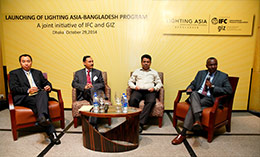IFC partners with GIZ in Bangladesh to increase energy access for off-grid communities

The Bangladesh program, a joint initiative of IFC and GIZ, is the third country program outside Africa India and Papua New Guinea.
During the program launch in October, Tobias Becker – Country Director of GIZ in Bangladesh said: “The purpose of the program is to provide energy efficient and cost effective lighting solutions in Bangladesh.”
The program aims to provide cleaner, safer, and better lighting options to the off-grid communities across Bangladesh.
Out of 160 million in Bangladesh, approximately 70 million people do not have access to grid electricity and another 60 million have unreliable grid connections.
The off-grid communities meet their lighting needs by burning fossil fuels like kerosene and diesel, which are inefficient, uneconomical, unhealthy, environmentally damaging and dangerous.
By displacing fossil fuel lighting with clean solar lighting, the program targets to avert emission of about 74,000 metric tons of carbon dioxide.
Lighting Asia/Bangladesh will address this problem by providing clean, solar powered lighting devices and appliances through using the private sector-driven market approach.
Solar energy products are rapidly transforming energy access in Bangladesh, where 50,000 solar homes systems are being installed every month, making it the fastest growing solar home systems program in the world, with World Bank financing. The country envisions achieving of universal access to electricity by 2021.

